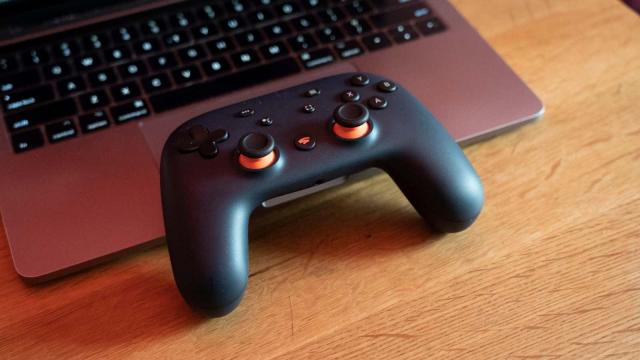Google Stadia was slow off the starting blocks following its launch in 2019, to put it gently. The beleaguered cloud gaming service promised to usher in a new era of gaming free of expensive hardware, but like most too-good-to-be-true products, Stadia has overpromised and underdelivered. In fact, after a year, Google pivoted its original plans for the service by shutting down in-house development studios in favour of relying on third-party games.
It now appears Google will continue this approach with a Hail-Mary addition, but it’s one that could resurrect the struggling cloud gaming service.
The unlikely possible saviour? Windows games.
Google, it appears, is building its own emulator to bring Windows games to its Linux-based cloud service and wants to teach third-party developers to do the same. We can thank Reddit user marvolonewt for the info, who found it within a description of a session that’s scheduled during the Google for Games Developer Summit on March 15. The session will describe technologies that allow developers to run “unmodified” Windows games on Stadia. It will also teach devs how to “write a Windows emulator for Linux from scratch.”
Marcin Undak from Google Stadia’s porting platform team will lead the 25-minute session. Here are the details:
How to write a Windows emulator for Linux from scratch?
Detailed overview of the technology behind Google’s solution for running unmodified Windows games on Stadia. This is a deep technical walkthrough of some of the core concepts with the goal to allow curious programmers to better understand such technologies and potentially to build their own.
It appears that Google has built its own emulator for Linux to help developers port their Windows games onto Stadia. However, the mention of helping devs build their own version raises some doubt on the effectiveness of Google’s solution. Google is likely referring to an “emulator” in terms of a compatibility layer for running Windows apps without actually emulating them. This could be similar to what Valve has achieved with the Steam Deck, a Linux-based handheld console that runs Windows games through a compatibility layer called Proton. If others follow Google and Valve’s lead, Linux would be well on its way to being the next big PC gaming platform.
As it stands, developers whose games run on Windows need to do some of the heavy lifting to optimise them for Stadia. Without any easy compatibility, Stadia is an ambitious gaming platform without enough games. Google has struck deals with third-party studios to flesh out its library, but many recent high-profile titles are still missing.
Google plans to open its summit with a keynote about Stadia, so we should learn more about where the platform is heading in just a few days, and whether it’s really being deprioritized, as a recent report suggested.
